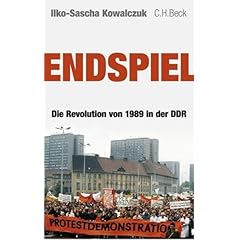
Endgame (
Endspiel) by Ilko-Sascha Kowalczuk is the title of one of the many books released this year to mark the 20th anniversary of the GDR's peaceful revolution and the fall of the Berlin Wall. Kowalczuk, a researcher at the office of the
Federal Commissioner for the archives of the former GDR state security service, traces the events in the GDR from mid-1988 to the first free elections in the GDR in March 1990.
Endgame is also the title of a feature-length drama

shown on Channel 4 this evening about a series of secret meetings (taking place at the time the GDR was imploding) organized by
Michael Young, then director of communications for Consolidated Goldfield, that helped pave the way for the end of apartheid in South Africa. This juxtaposition is a reminder of how the changes in Germany at the end of the 1980s need to be seen against the background of a wider epochal change. My own memory of how these two movements are interlinked is that on the day of the
Nelson Mandela 70th Birthday Tribute Concert, held in Wembley Stadium on 11 June 1988, I was at a meeting of the German-German working group of
European Nuclear Disarmament, where we had one eye on the TV and another on our discussions. The mood in the GDR was sombre - a crackdown on dissent had led to activists being involuntarily exiled from East Germany, there were growing protests against state censorship. Less than 18 months later the South African theologian John de Gruchy was in New York where he watched the growing popular protests in the GDR in September 1989, an experience he
described in 1997 at the Leipzig Kirchentag:
Unter den Meldungen der Woche gab es damals zwei, die unmittelbar nacheinander gesendet wurden. Die erste zeigte Fernsehfilme der Protestversammlungen in Leipzig und die Flucht ostdeutscher Bürger über die Grenze in die Tschechoslowakei; die zweite zeigte die Eskalation der Protestmärsche gegen Apartheid in Kapstadt, meiner Heimatstadt ... [Wir] wußten..., daß dies für die Apartheid der Anfang vom Ende bedeutete. Darüber hinaus spürten wir, daß die dramatischen Ereignisse in Osteuropa in einem geschichtlichen Zusammenhang mit den Geschehnissen in unserem Land standen. Und das sollte sich bewahrheiten. Denn ohne den Zusammenbruch der Mauer in Berlin im Jahr 1989 wäre es unwahrscheinlich, daß die Wende in Südafrika zu dem damaligen Zeitpunkt stattgefunden hätte.
In his book
Christianity and Democracy he has reflected on the parallels (and differences) between the transition in the two countries.
 Endgame (Endspiel) by Ilko-Sascha Kowalczuk is the title of one of the many books released this year to mark the 20th anniversary of the GDR's peaceful revolution and the fall of the Berlin Wall. Kowalczuk, a researcher at the office of the Federal Commissioner for the archives of the former GDR state security service, traces the events in the GDR from mid-1988 to the first free elections in the GDR in March 1990. Endgame is also the title of a feature-length drama
Endgame (Endspiel) by Ilko-Sascha Kowalczuk is the title of one of the many books released this year to mark the 20th anniversary of the GDR's peaceful revolution and the fall of the Berlin Wall. Kowalczuk, a researcher at the office of the Federal Commissioner for the archives of the former GDR state security service, traces the events in the GDR from mid-1988 to the first free elections in the GDR in March 1990. Endgame is also the title of a feature-length drama 



0 comments:
Post a Comment